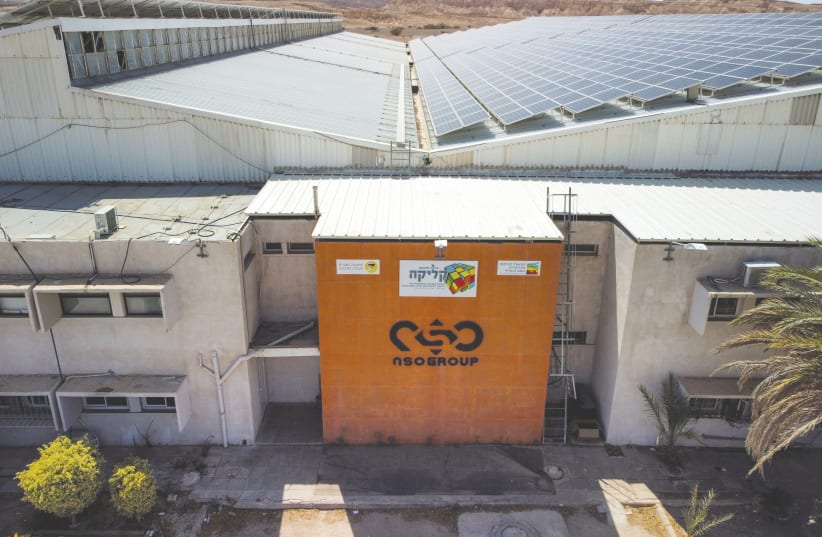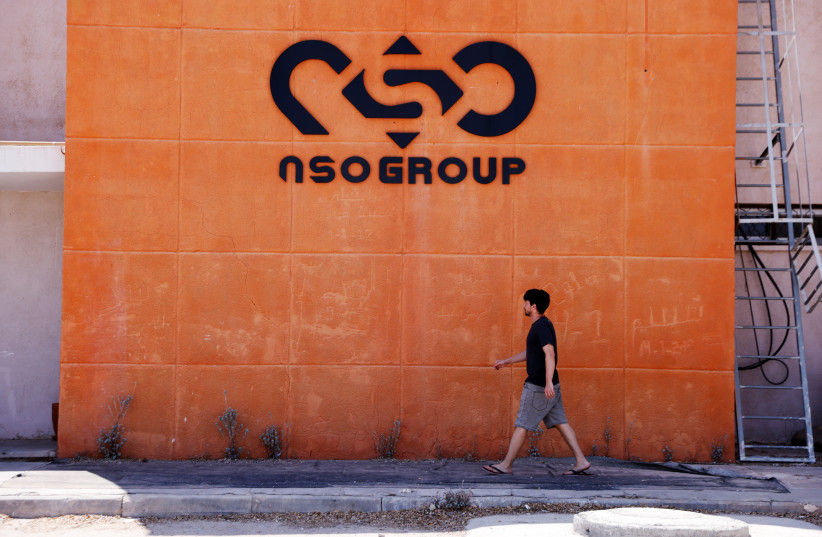On January 16, 2020, a gathering took place in Tel Aviv District Court that is not often seen in Israeli courthouses. A group of over a dozen officials from various Israeli security agencies was there, some identifiable as from the Defense Ministry, others from more secretive organizations. The spokesperson for the Defense Ministry was also present.
The group was there to respond to a petition filed to Judge Rachel Barkai by Amnesty, the international human-rights organization, asking that she order the Defense Ministry to revoke the export license for NSO’s Pegasus spyware.
The petition followed news that NSO products were used by Saudi Arabia to track and eventually murder Jamal Khashoggi in October 2018, as well as against a long list of international journalists, politicians and human rights activists.
When the hearing began, state prosecutor Sarah Bilu immediately asked the court to remove all members of the public and media from the courtroom. “We are dealing with a matter that is directly connected to national security,” said Bilu, who was representing the Defense Ministry. “I will not be able to say anything and will have to remain silent.”
Bilu lectured the judge and tried to argue that even arguments on whether the hearing should remain open needed to be held behind closed doors. Barkai was not willing to go that far, but after 15 minutes of arguments, she accepted the state’s position and removed everyone from the courtroom.
With the gag order in place, it was only a matter of time before the expected verdict came down. Six months later, Amnesty’s case was thrown out, and NSO was able to continue marketing its products around the world.
While the Israeli government had no problem fighting to allow NSO to continue selling its products, the government has remained silent amidst a growing number of reports about the problematic use of those products in the hands of regimes that aren’t known for their exemplary track record on human rights.
Officially, Israel does not say much. It has tried to quietly organize some damage control, like when Defense Minister Benny Gantz flew to Paris to patch things up with French President Emmanuel Macron, whose phone was apparently targeted by NSO’s Pegasus. But as Foreign Minister Yair Lapid said on Saturday night when asked about the Biden administration’s decision to blacklist the company, “NSO is a private company, it is not a governmental project, and therefore even if it is designated, it has nothing to do with the policies of the Israeli government.”
This is where Lapid is wrong. What the Commerce Department decided might seem like it is about a company, but it actually has a lot to do with the policies of the Israeli government. Hiding behind the claim that NSO is a private company will not work.
Imagine for a moment a different scenario. Israel Aerospace Industries, the government-owned weapons company, is known to supply missiles to Azerbaijan. While the company does not publicize the deals, IAI’s suicide drone Harop was seen in action in July 2020 during Azerbaijan’s mini-war with Armenia.
What would have happened had a Harop drone or a Spike missile made by Rafael – also sold to Azerbaijan – landed on an Armenian school and killed dozens of children? Would Israel have been able to pretend that it had nothing to do with it? Would it have been able to hide behind statements that IAI or Rafael are “private companies”?
Of course not. This does not mean that Israel would have halted arms sales to Azerbaijan, but there would have definitely been calls for that to happen. Either way, burying its head in the sand would not have been an option.
The reason that it is an option with NSO is not only because it’s a private company, but because of the products the Herzliya-based company develops and exports. Cyber weapons are not comparable to missiles or drones. When the latter falls somewhere, it leaves shrapnel and debris, and sometimes – as seen in Armenia as well as on other battlefields – the remaining parts show an imprint revealing the weapon’s Israeli origins.
The same cannot be said about cyber weapons like Pegasus. If Israel admits to allowing the sale of cyber weapons, then it would be held accountable for the way those weapons are used. It would need to answer questions that would lead to more calls – like Amnesty’s – to limit the sale and use of those weapons.
To some extent, this is similar to why Israel does not admit to having drones that can fire missiles. The use of missiles on these unmanned aircraft has been extensively documented in US diplomatic cables as well as at international air shows, but publicly, the IDF does not admit to using attack drones.
It can’t. Israel decided in 1991 to operate according to the guidelines of the Missile Technology Control Regime (MTCR), a multinational and informal political understanding between 35 countries aimed at limiting the proliferation of missiles and missile technology. Armed drones would fall into that category, and Israel does not want questions about what it does. When asked about the use of armed drones or the sale of armed drones, the answer is always the same from Israeli officials: a shrug, a smile – and no comment.
If Israel admitted to having armed drones then exporting them would fall under the restrictions imposed by the MTCR. Ambiguity provides flexibility and the ability for Israel to maneuver between its own alleged use of armed drones and sales to other countries.
The same applies to cyber weapons. When used, it is very hard to trace a cyber weapon back to its operator. Until today, as an example, Israel still does not claim responsibility for Stuxnet, the cyber worm that infected Iran’s main uranium enrichment facility in 2010 and is widely seen as one of the world’s first wide-scale military cyberattacks.
The moment a country opens up to using these kinds of weapons, it puts itself in the crosshairs of politicians, advocacy groups and antiwar activists who are already seeking to create a convention – similar to the MTCR – that would put limits on the use of cyber weapons. With every story about NSO, the calls grow.
“In the future, a licensing requirement should be the default for tech companies that contravene the human rights standard of democratic states,” Marietje Schaake, a former Dutch politician who serves as the international policy director at Stanford University’s Cyber Policy Center, wrote in the Financial Times this week. “This would ensure better controls of end use and exports. Regulation would also allow for mapping of how software is being deployed, and enable greater transparency.”
Israel, naturally, does not want to be required to meet that level of transparency, and it also does not want to face the dilemma of whether to join another MTCR-style convention.
While Israel has previously joined some international weapons agreements, there are others that it has refused to sign onto, like the NPT, meant to control the proliferation of nuclear weapons. The refusal to sign the NPT has been used repeatedly over the years against Israel. Why give detractors another tool?
The Israeli defense establishment also wants to retain the ability to not only use NSO’s products for its own security, but also to make deals with countries that can then be leveraged for diplomatic gain.
In general, Israel is not transparent when it comes to its defense sales. While it takes pride in the billions of dollars that it annually brings into the economy, Israelis do not know how their government is using the weapons it develops, or even to which countries these weapons are being sold.
In the United States, for example, arms sales have to be approved by Congress. This allows transparency and accountability. In Israel, there is barely any oversight except for a vague unclear defense export control office in the Defense Ministry.
Israel prefers it this way, so it can engage in so-called “arms diplomacy,” which has been used effectively in establishing diplomatic relations with many countries including Singapore, India and China.
All three countries were wary of announcing formal ties with the Jewish state, but had no problem purchasing Israeli weaponry and military expertise. Israel and India, for example, only established formal relations in 1992, but weapons sales had been going on for decades before then.
NSO has tried hard to maintain its own damage control but it is not working. In recent years, it hired a long list of former senior IDF officers – like former deputy IDF spokesperson Oded Hershkowitz, and former military censor Brig.-Gen. Ariella Ben-Avraham – to try to manage the media fallout from its operations. It also is said to work closely with a list of ex-army generals and top defense officials.
The relationship has been beneficial to all parties involved. Until now, NSO has been able to make sales of hundreds of millions of dollars, bringing profit to its investors, leverage to the state, and technological advantage to its customers.
Can Israel keep up the show? It remains to be seen. NSO is a major headache right now for the government in Jerusalem. Pretending that this is about a private company and nothing more is not a serious approach. It is time for the government to rethink what it is doing.

